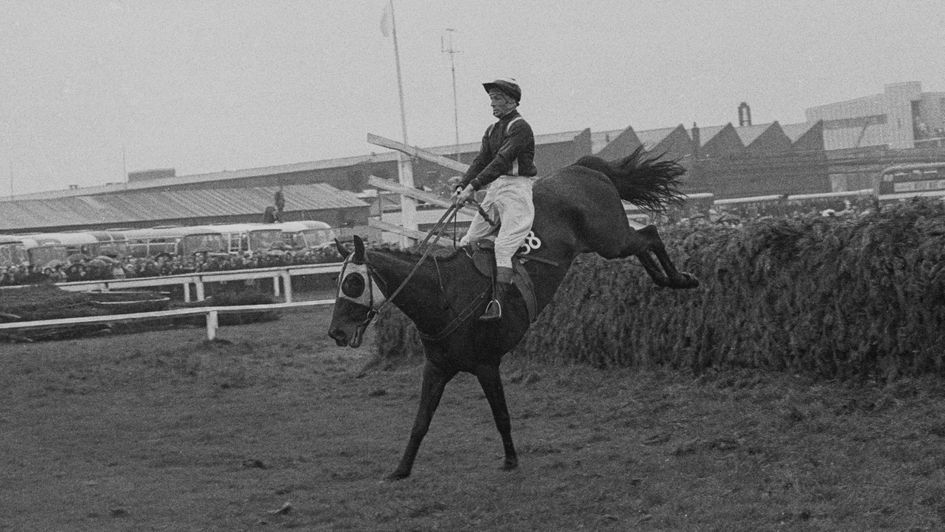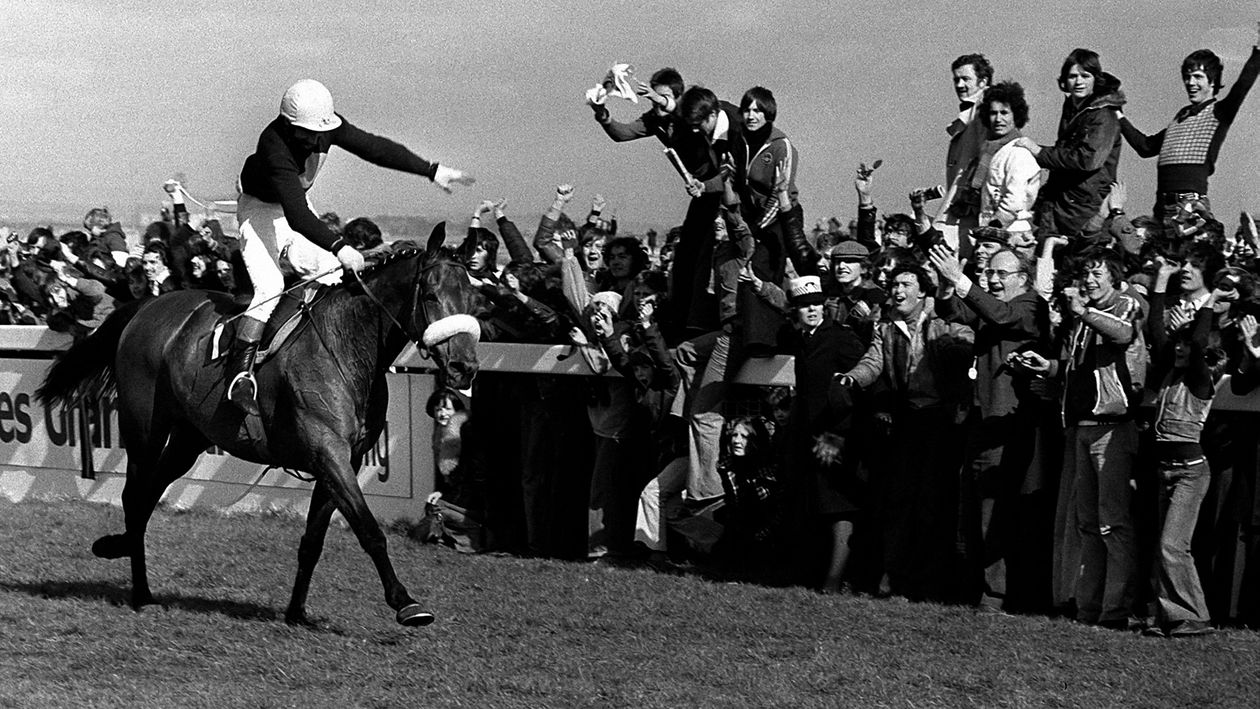Cornelius Lysaght cherry picks the most iconic Grand Nationals from a timeline beginning in 1839 right up to Tiger Roll and the present day.
1839 LOTTERY
The race recognised as the first Grand National – though actually titled the Grand Liverpool Steeplechase – was also the slowest-run with Lottery taking just under fifteen minutes to complete a new course located in countryside at Aintree, a few miles north-east of the city. It was not just the tradition of the event that began in 1839: when falling at a ditch, a runner named Conrad deposited his rider Captain Martin Becher into the waters of the brook below, giving the obstacle its historic name.
1899 MANIFESTO
While we admire Grand National ‘regulars’ in the modern era, none can match Manifesto, a runner in the race a record eight times between 1895 and 1904, with form figures of 4-Fell-1-1-3-3-3-9, and making his final appearance aged 16. In 1899, shouldering a massive 12 stone, 7 pounds, jointly the most ever carried to victory, Manifesto survived a heart-stopping scare when slipping at the Canal Turn on the first circuit before winning. The Grade One Manifesto Novices Chase opens the Grand National Festival.
1905 KIRKLAND
In 2021, if getting a run, the Evan Williams-trained big fancy Secret Reprieve would be only the second Grand National winner trained in Wales, after Kirkland, a horse steered to victory by Merseyside-born champion jockey ‘Tich’ [Titch] Mason in 1905, despite being severely impeded late on. So confident was owner Frank Bibby about his runner, the 1904 runner-up, that he paid Mason the princely sum of £300 – close to £40,000 in modern-day money – not to ride during the preceding weeks to avoid injury.
1934 GOLDEN MILLER
When Golden Miller landed the Grand National less than three weeks after the third of his record five victories in the Cheltenham Gold Cup he was guaranteed an iconic place in sporting history as the first horse to pull off the same-season double in jump racing’s two most prestigious prizes, a feat that has never been matched in the decades since. In 1991, that year’s Gold Cup winner Garrison Savannah came close, only being denied in the very closing stages of a thrilling finish by Seagram.

1956 ESB
ESB was the horse left in front when, with a few strides to go, the clear leader Devon Loch, ridden by subsequent best-selling author Dick Francis in the silks of the Queen Mother, was at the centre of one of the most bizarre and discussed incidents in Aintree history, springing into the air before belly-flopping onto the turf. Despite other theories revolving around the horse glimpsing a ‘phantom’ fence or cramp, Francis put it down to the cacophony of noise from the crowd.
1959 OXO
On Cloth Cap, Tom Scudamore looks to continue a long-term family link with the Grand National, 62 years after his jockey-grandfather Michael, a stalwart of the 1950s and 1960s weighing-room, got the better of the breathless finish in 1959 when Oxo beat Wyndburgh, ridden by Tim Brookshaw, one of whose stirrup leathers had snapped. In twelve attempts, Scudamore’s champion jockey-father Peter was never closer than third on Corbiere (1985), but he’s been assistant to winning trainers Nigel Twiston-Davies (twice) and his partner Lucinda Russell with One For Arthur (2017).

1967 FOINAVON
There have been five 100-1 Grand National winners but none as celebrated as Foinavon, the ‘no-hoper’ that was the only runner to successfully navigate through a pile-up at the 23rd – the fence after Becher’s Brook on the second circuit, now named in the horse’s honour – which was caused when a loose horse ran across the field. Behind the others, Foinavon’s jockey John Buckingham found a path through the chaos and set off with a sizeable lead which, although considerably reduced by remounted opponents, was still fifteen lengths at the finish.

1973 RED RUM
In perhaps the greatest Grand National finish, the Red Rum era began when the eight-year-old, with 10 stone, 5 pounds on his back, made up fifteen lengths on the run-in to grab victory in the final strides from Crisp, carrying 12 stone. The big-jumping, ex-Australian champion Crisp led from the first Becher’s Brook and looked to have an unassailable lead for much of the way; the following season Red Rum and Crisp clashed in a match-race at Doncaster carrying identical weights, with Crisp comfortably coming out on top.

1977 RED RUM
Red Rum’s position as the all-time greatest Grand National winner remains: after 1973, he humped 12 stone to victory in 1974 before finishing runner-up to L’Escargot a year later, and to Rag Trade in 1976. Despite coming into the 1977 race off the back of defeats at Kempton, Newcastle and Haydock (four times), Aintree again sparked the horse into life, and he won what was to be his last race at the track – and final success – 25 lengths clear. Trainer Ginger McCain retired him ahead of the 1978 race.
1981 ALDANITI
Aintree’s reputation for producing sporting fairytales reached new heights in 1981 when Bob Champion overcame cancer at a time when treatment was nothing that of today to triumph on Aldaniti, a horse previously written off because of crippling injury but nursed back to fitness by trainer Josh Gifford. Their heart-warming story reached an even wider audience with a movie starring John Hurt as Champion, and proved an inspiration to cancer sufferers and their families around the world; a charity set up by the jockey has raised over £15m for research.

1983 CORBIERE
A breakthrough year when Jenny Pitman became the first female trainer to win, with Corbiere ridden by Ben de Haan to a narrow defeat over Greasepaint. Pitman, one of British sport’s best-known faces as a result of her exploits at Aintree, also won the race in 1995 with Royal Athlete, and her runner Esha Ness was first home in the ‘race’ of 1993 which was ultimately voided after a string of false starts. Subsequently Venetia Williams, Sue Smith and Lucinda Russell have all trained winners as well.

1997 LORD GYLLENE
When Lord Gyllene, ridden by Tony Dobbin, galloped off with 1997 Grand National it was 48 hours later than scheduled after an IRA bomb threat on the Saturday afternoon forced the immediate evacuation, on foot, of everybody at the track; the people of Merseyside were praised for welcoming thousands of stranded visitors. Nothing was discovered during expert searches and the decision was made to go ahead on the Monday, with the prime minister John Major, in the closing stages of the General Election campaign, amongst those in attendance.

1999 BOBBYJO
With the current Irish dominance of jump racing, it seems extraordinary that when jockey Paul Carberry brought home Bobbyjo, trained by his father Tommy, to victory it was the first time that a runner from Ireland had won the iconic prize since L’Escargot, with Carberry senior then riding, had beaten Red Rum twenty-four years earlier in 1975. In the twenty stagings since Bobbyjo, the trophy has gone to Ireland eight times, and in 2021 most of the leading contenders are based across the Irish Sea.

2010 DON’T PUSH IT
AP McCoy’s good humour used to be well-tested ahead of the Grand National mounts as his first fourteen mounts in the race all proved losers – the luckless run on Clan Royal, carried out by a loose horse when clear in 2005, always seemed to be mentioned. But Don’t Push It changed everything for the jockey, for owner JP McManus and for trainer Jonjo O’Neill – who never even got around in seven riding attempts – all of whom were enjoying initial successes. It pushed McCoy’s profile to an unprecedented level.

2019 TIGER ROLL
What a pity Tiger Roll won’t seek to equal Red Rum by attempting a third victory in 2021 because for a new generation a modern hero is just what’s needed – fans must be well into middle age nowadays to have any kind of clear recollection of the 1970s star. The diminutive Tiger Roll, also a five-time Cheltenham Festival winner, had to dig deep for Aintree victory first time round, but, sent off as 4/1 favourite in 2019, was much more emphatic, really catching the public imagination in the process.

More Grand National
More on the 2021 Grand National
- Full 2021 Grand National guide
- Full racecard & free video form
- Ben Linfoot's Pinsticker's Guide
- Grand National trends preview
- Alex Hammond: National shortlist
- Sporting Life & Timeform shortlist
- Cornelius Lysaght: Great Nationals
- Podcast special: Richard Pitman
- Antepost Angle: Grand National
- Grand National: Tips Centre
- Grand National: All our features












